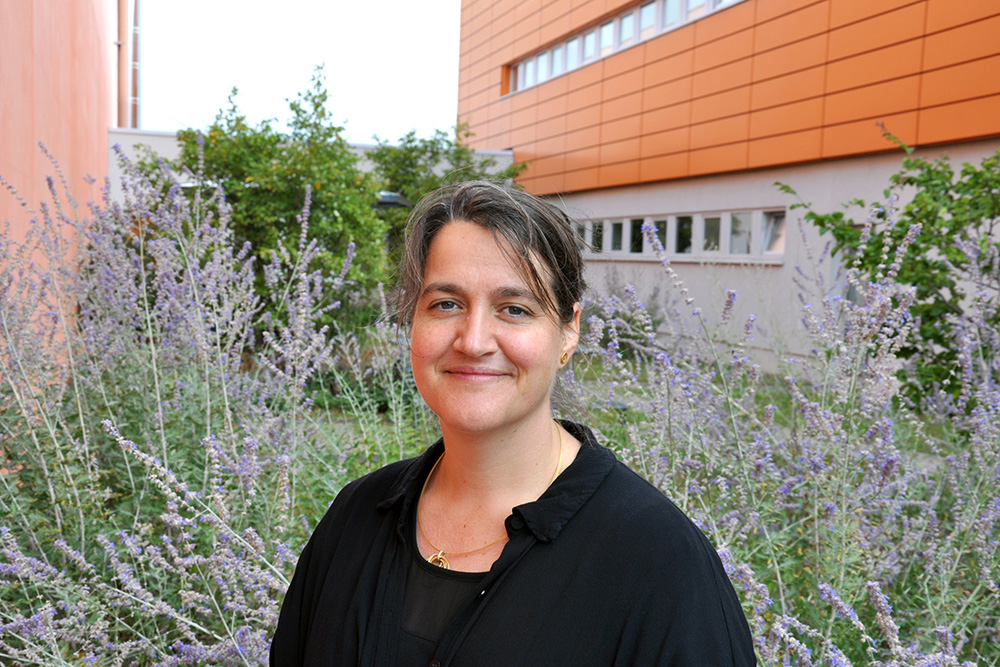Author / video: Annegret Kolarow
#diensttalk with Dr. Stefanie Seitz on transfer and vocational training
The Tuesday feature. In the #diensttalk series, our employees give a brief insight into their activities and reveal what vision drives them.
Dr. Stefanie Seitz holds a PhD in biology. She works in science management at IKTS. As a transfer expert, she supports researchers in implementing their ideas and bringing their knowledge and developments into application. Continuing professional development is an exciting transfer path for which she develops innovative formats.

Stefanie, you work as a transfer expert at IKTS. What brought you to Fraunhofer and what are your responsibilities?
As a biology postdoc, I came to innovation research via the trans- and interdisciplinary field of technology assessment and later to knowledge and technology transfer. I have now been working in science management for eight years. As a transfer expert, I support our researchers in putting their knowledge and research findings into practice so that they can have an impact in the outside world. In terms of technology transfer, this means getting in touch with customers to identify needs, form consortia and identify funding opportunities. Typical tasks in knowledge transfer are, for example, developing school projects or designing professional development courses for employees.
"As a transfer expert, I support our researchers in putting their knowledge and research findings into practice so that they can have an impact in the outside world."
Why is Fraunhofer IKTS involved in the field of vocational training?
In view of the shortage of skilled workers and the transformation processes in various sectors, for example in the automotive industry, it is very clear that lifelong learning is very important. For companies, this means that they must be able to prepare their employees for new technologies and production processes as quickly as possible. This is why continuing professional development is so important. IKTS offers great expertise for companies, which we want to make accessible to support them in their transformation. To this end, we have set up an e-learning platform that allows us to develop blended learning solutions tailored to the needs of companies – and thus to offer learning formats that are independent of time and place.
What exactly does blended learning mean and do you have an example of its implementation?
Blended learning involves learning both online and in on-site courses. Online and offline formats can be combined to create a learning experience that is tailored to the company's needs. As we learned in our project “BeaT – Renewing vocational training for the automotive transformation”, companies that continuously train their workforce are particularly successful. At the same time, the shortage of specialists and workers leaves them little room to maneuver. Blended learning arrangements help here, as does our approach of professionalizing peer learning, i.e. learning from colleagues. As part of BeaT, we have developed a training program for employees in production and tested it with our practice partners, which helps to make the internal training process more efficient.
What is the appeal of transfer for you?
It is particularly exciting for me to work at this crossroads between science and society – in other words, where science can have an impact on the outside world. For example, when customers from industry can use our technologies or we can do something good for local authorities and public institutions. I meet many different companies and stakeholders and find out what drives them and how we can support them with our research. We not only transfer our technologies, but also our knowledge. I find the projects with schoolchildren particularly enriching.
You also support young people in a mentoring program. What advice do you give them?
Transfer also means supporting young scientists who want to find their way in industry outside the university. I tell them that it is very important to establish connections with companies at an early stage and to build up a network. A network is of course very important for all researchers, but even more so for people who want to go into industry.

Privacy warning
With the click on the play button an external video from www.youtube.com is loaded and started. Your data is possible transferred and stored to third party. Do not start the video if you disagree. Find more about the youtube privacy statement under the following link: https://policies.google.com/privacyDr. Stefanie Seitz holds a PhD in biology. She works in science management at IKTS. As a transfer expert, she supports researchers in implementing their ideas and bringing their knowledge and developments into application. Continuing professional development is an exciting transfer path for which she develops innovative formats.
Further information:
- News "Vocational training in the automotive industry – E-mobility places new demands on professional qualification"
- BeaT project website (German)
- Publication on peer learning (German)
Here you can find more #diensttalks. Take a look behind the scenes of Fraunhofer IKTS.
Also stay informed: You are welcome to subscribe to our newsletter, read our other blog articles and follow us on LinkedIn, Instagram and YouTube.